
Government announces review into Covid vaccine and treatment contracts
The Albanese government has ordered an independent review into Australia’s existing procurement contracts for Covid-19 vaccines and treatments “to ensure that they are fit-for-purpose” now and into 2023 as new subvariants emerge.
Announcing the review in Canberra, health minister Mark Butler said that Jane Halton – who led the national review of hotel quarantine earlier in the pandemic and is co-chair of the Covax initiative – will conduct the independent review “as a matter of some urgency”.
Butler said the review will “take stock of current contracts and the existing supplies we have in country of vaccines and treatments” for all different age groups.
He has also asked Halton “to cast forward and to provide us with some advice about likely developments in (Covid variants and treatments) over the rest of 2022 and into 2023”. Halton will also be asked to advise the government if she believes any existing arrangements should be altered.
Butler stressed that the review is “not about looking back and examining the rights and wrongs of the former government’s approach to negotiating these contracts in the first place”. Rather, he said, it is to “ensure that arrangements that might have been fantastic three months ago are fit-for-purpose for the rest of this year and into next year”.
Butler said there is no deadline for the review, but that the government wants it conducted “in weeks, not many months” due to the urgency of the risk posed by emerging variants and subvariants of Covid. He said:
We are determined as a government to stay on the front foot in the fight against this virus and ensure that the Australian community has priority access to the best possible vaccine protection against this virus and all of its variants, and the best possible cutting-edge treatments to prevent severe illness and death for vulnerable Australians.”
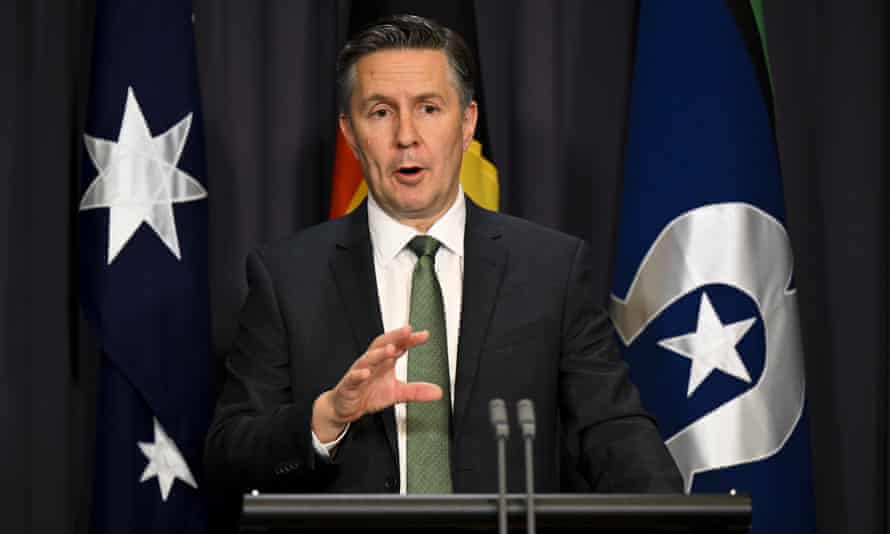

Daniel Hurst
Penny Wong winds up trip to Malaysia
The minister for foreign affairs, Penny Wong, is about to finish her trip to Malaysia. She has spoken with reporters in Kota Kinabalu, where she spent the early years of her life.
Wong is clearly seeking to deepen Australia’s ties with south-east Asian countries:
I think it matters that Australia speaks to south-east Asia in a way that recognises that we are part of this region and that our futures are shared. These are challenging times in the world, we’re all seeking to navigate these challenging times and we do it best when we do it together. And that collectivity comes from an understanding that our future prosperity and security is shared.
Wong is also seeking to present a picture of modern Australia. She notes that one in two Australians were either born overseas or have parents who were born overseas:
I hope that my personal story can contribute to the relationship but more importantly what I want to emphasise is that it is not only my story – this is a story that many Australians can tell.We have so many Australians who were born overseas or whose parents were born overseas who have connections with south-east Asia and other countries around the world.
We are a multicultural and diverse nation. And I hope in part my story can contribute to reminding people in this region and throughout the world that Australia is a modern, diverse multicultural society which is keen to continue engaging with the region.”
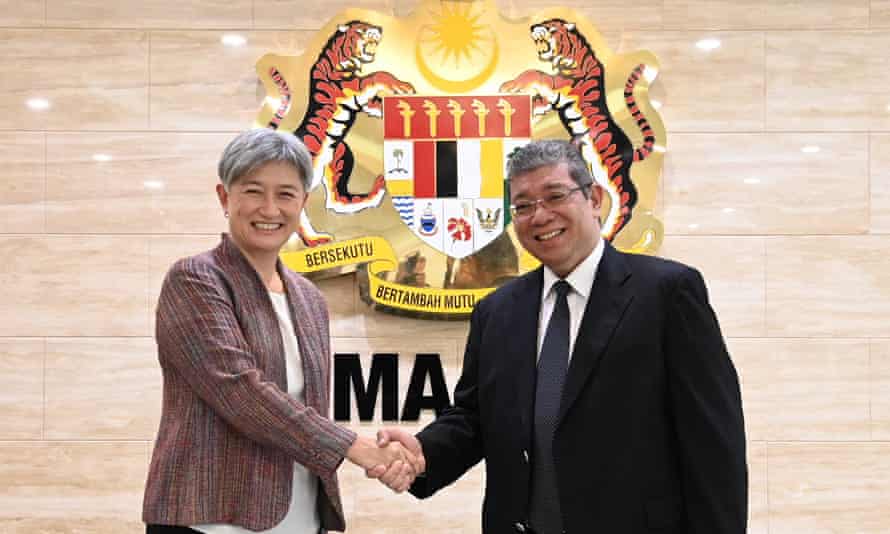

Paul Karp
Reforms to parliament rules flagged
Tony Burke, the leader of the house, has met with crossbench MPs this morning about new proposed standing orders for the House of Representatives.
Burke signalled early in the term of the new government that he was “determined to fix” how parliament works in response to a long list of demands to give the crossbench more say.
Guardian Australia understands the new rules include more opportunities for the crossbench to speak including more questions in question time, a move criticised by manager of opposition business, Paul Fletcher, who thinks the opposition are better at scrutinising the government than the crossbench.
On Thursday, Burke said:
I have been conducting productive consultations with Labor, the crossbench and the manager of opposition business about potential changes to standing orders. These changes have also been informed by the Jenkins review. Final drafting is not yet complete but I am hoping to introduce changes in the first week of parliament.”
Regarding the signal about the Jenkins review, it’s worth noting that it recommended:
- A “review of the Parliamentary sitting calendar and the Order/Routine of Business with a view to enhancing wellbeing, balance and flexibility for parliamentarians and workers in Commonwealth parliamentary workplaces”. Could that mean shorter sitting hours? Allowing MPs to vote remotely, as the Senate allowed during covid?
- A committee to establish a code of conduct for parliamentarians – an idea that has been taken up with enthusiasm by independent MP Kylea Tink
Independent MP Zoe Daniel said the meeting was “productive and collaborative”. So sounds like things are going more smoothly than the cut to crossbench staff, which will be revisited when Anthony Albanese returns from his Nato trip.
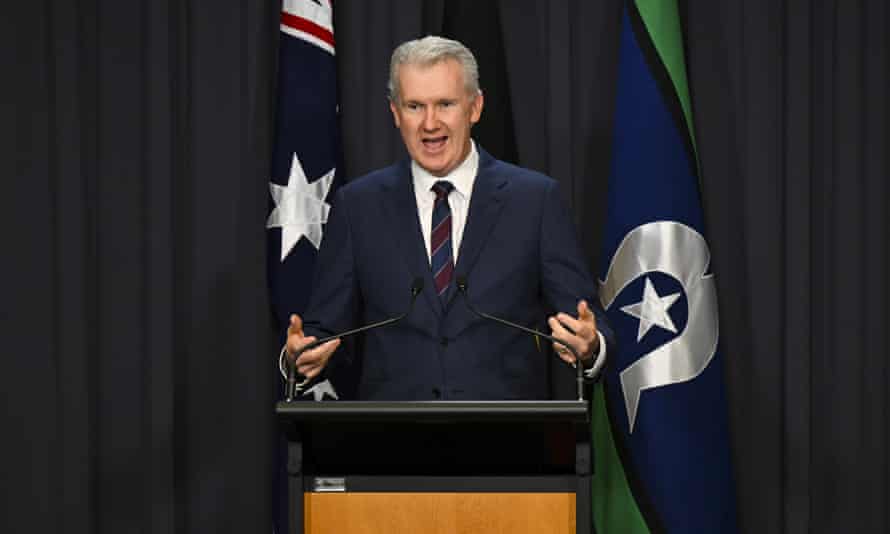
Government announces review into Covid vaccine and treatment contracts
The Albanese government has ordered an independent review into Australia’s existing procurement contracts for Covid-19 vaccines and treatments “to ensure that they are fit-for-purpose” now and into 2023 as new subvariants emerge.
Announcing the review in Canberra, health minister Mark Butler said that Jane Halton – who led the national review of hotel quarantine earlier in the pandemic and is co-chair of the Covax initiative – will conduct the independent review “as a matter of some urgency”.
Butler said the review will “take stock of current contracts and the existing supplies we have in country of vaccines and treatments” for all different age groups.
He has also asked Halton “to cast forward and to provide us with some advice about likely developments in (Covid variants and treatments) over the rest of 2022 and into 2023”. Halton will also be asked to advise the government if she believes any existing arrangements should be altered.
Butler stressed that the review is “not about looking back and examining the rights and wrongs of the former government’s approach to negotiating these contracts in the first place”. Rather, he said, it is to “ensure that arrangements that might have been fantastic three months ago are fit-for-purpose for the rest of this year and into next year”.
Butler said there is no deadline for the review, but that the government wants it conducted “in weeks, not many months” due to the urgency of the risk posed by emerging variants and subvariants of Covid. He said:
We are determined as a government to stay on the front foot in the fight against this virus and ensure that the Australian community has priority access to the best possible vaccine protection against this virus and all of its variants, and the best possible cutting-edge treatments to prevent severe illness and death for vulnerable Australians.”

Federal government urges people to get third and forth Covid vaccinations
Health minister Mark Butler has called for Australians to get their third Covid vaccine doses, and fourth for those eligible, amid community spread of new subvariants throughout winter.
Butler issued the plea as the Therapeutical Goods Administration announced provision approval of Pfizer’s Covid-19 vaccine for use in children aged six months up to five years. (This is only the first step – for the vaccine to be provided, it will also need to be recommended for administration to this age group by Atagi.)
Speaking from Canberra, Butler said:
Two doses does not give you sufficient protection against these new variants. I have also talked about the need to lift our efforts in getting fourth doses into the arms, particularly of aged care residents.
I’m pleased to say that that rate has increased by about 10% since I was last before you a week or so ago. There’s still more to do, there’s no question about that. Only 64% of aged care residents eligible for their fourth dose have now got it. I want to see that rate increase dramatically.”
Butler said the BA.4 and BA.5 subvariants of Omicron are starting to become the predominant infections on the eastern seaboard, and “they are starting to see not just case numbers increase in a number of jurisdictions, but very worryingly hospitalisation numbers increase as well.”
Butler said:
We’re only still starting to understand the impact of BA.4 and BA.5 in terms of its transmissibility, in terms of the ability for people who might have had one of the other subvariants of Covid earlier in the year to become reinfected with this new subvariant.
And also whether or not this new subvariant is or is not more severe than some of the other subvariants with some research indicating that it might impact the lungs a little bit more than others.”
South Australian football great Neil Kerley dies in car accident aged 88
Australian Football Hall of Fame member and “proud and passionate South Australian” Neil Kerley has died in a car crash. He was 88.
Kerley made his mark on Australia’s home-grown football code as an outstanding player, coach, administrator and media figure.
Even long after his retirement as a player, Kerley’s passionate support for South Australia – especially in State of Origin clashes with arch-rival Victoria – was unrivalled.
Kerley – affectionately nicknamed “Knuckles” – played 276 games for West Adelaide, South Adelaide and Glenelg, and represented his state 32 times. He also coached five SANFL clubs to a total of four premierships.

Read more:

Michael McGowan
NSW transport minister calls on John Barilaro to quit New York trade job
It’s been revealed John Barilaro contacted NSW deputy Liberal party leader, Stuart Ayres, to enquire about “the status” of a $500,000 New York trade commissioner job prior to it being publicly advertised, as pressure grows on the former deputy premier to withdraw from the role.
On Thursday, the NSW transport minister, David Elliott, broke ranks and called for Barilaro to “do the honourable thing” and quit of his own accord.
“My very, very strong view is that he shouldn’t be going to New York and I’m pretty sure that that’s the view of the majority of people in this state,” Elliott said.
Read more:
And that’s where I’ll leave you for today. You’ll be with my esteemed colleague Elias Visontay from here on out – enjoy your afternoon!

Caitlin Cassidy
More Australians living in apartments, census data shows
Australians are turning to apartment living in record numbers, as the gap between private property rental prices and apartments continues to widen.
About 1.3 million people now live in flats according to the 2021 census, an increase of 1.1% compared to 2016. At the same time, the number of Australians living in terraces and townhouses has stagnated, staying flat at 1.1 million people.
The Australian Housing and Urban Research Institute managing director, Dr Michael Fotheringham, said Australia needed to catch up to the fact the 1950s dream of raising a family to the backdrop of a back yard and a Hills hoist was increasingly out of reach for low to middle-income households – particularly in the middle of a rental crisis.
Read the whole story here:
Some images are trickling in now from the teacher strike in New South Wales.
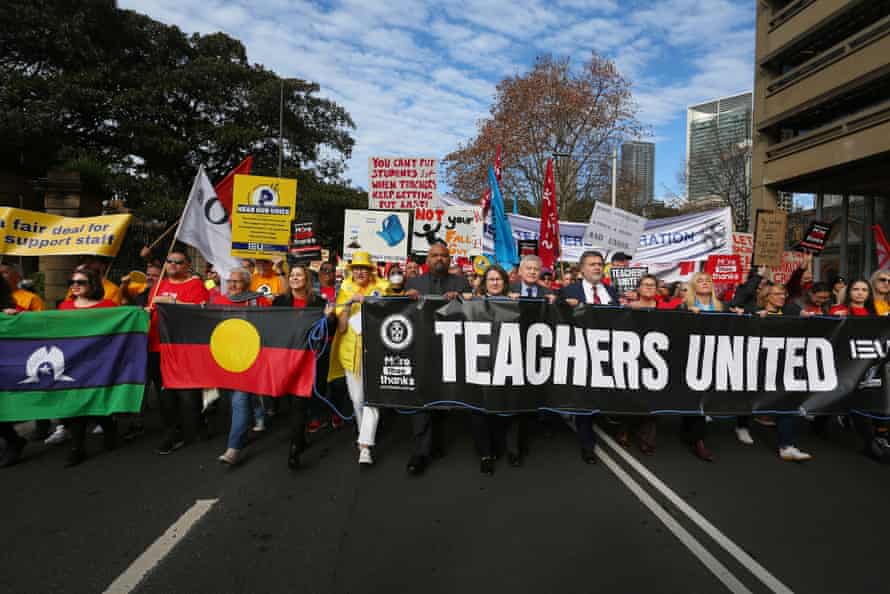
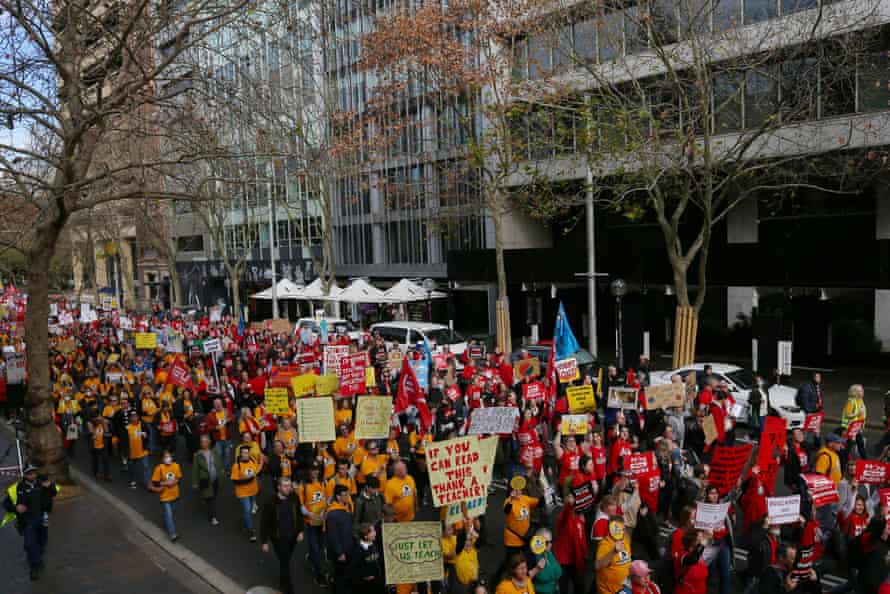
Job vacancies jump by 14% in the last three months
Peter Hannam
The Australian Bureau of Statistics has reported another big jump in job vacancies, with almost half a million jobs on offer as of May.
That tally’s double the level of pre-Covid times, if you can recall what the world looked like in February 2020. Of all the forecasts around the economy during the height of the pandemic, predictions about the labour market – in many nations – have proven to be the most off the mark.
Up, up and away…job vacancies near half a million, ABS says. (Have to think it will feed into higher wages sooner or later…) pic.twitter.com/iRYlfZOZIP
— Peter Hannam (@p_hannam) June 30, 2022
Anyway, in the past three months, job vacancy numbers have jumped by 14%, with “customer-facing” roles the most in demand, according to the ABS. (Perhaps that’s a sign of heightened absentee rates given the rapid spread of Covid and now flu in many workplaces.)
So about one in four businesses say they are looking for employees, or double the pre-pandemic proportion:
Bjorn Jarvis, head of labour statistics, at the ABS said:
The large growth in vacancies through the pandemic has coincided with a decline in the number of unemployed people.
As a result, there was almost the same number of unemployed people and vacant jobs in May 2022.
That’s about 1.1 unemployed people per vacant job. Back in early 2020, the ratio was closer to three jobless people per vacant position.
Victoria has had the largest jump in vacancies since February, rising 18%, ahead of NSW’s 12% rise. The Northern Territory, though, has the biggest share of companies looking to fill roles, with almost one in three on the hunt.
The industries with the highest growth in vacancies over the quarter were retail trade, up 38%; information media and telecommunications services, up 18%; and arts and recreation services, up 16%.
Perhaps now might be the time to put in that resume or ask for a pay rise?
TGA provisionally approves Pfizer vaccine for children from six months old
The Therapeutic Goods Administration has provisionally approved Pfizer’s Covid-19 vaccine, Comirnaty, for use in children aged six months up to five years.
This is only the first step – for the vaccine to be provided, it will also need to be recommended for administration to this age group by Atagi.
In a statement, the TGA said:
Provisional determination is the first step in the provisional registration process. Approval and potential supply in Australia would only commence should the vaccine be approved as safe and effective by the TGA and recommended for administration to this age group by ATAGI (the Australian Technical Advisory Group on Immunisation). It does not mean an application for use in this age group has been made and it does not mean any subsequent application would be approved.
On receipt of an application to provisionally register COMIRNATY for use in this age group, the TGA will undertake a rigorous assessment of the safety, efficacy and quality of this vaccine with the highest priority.
Environment Victoria says energy roadmap ‘not fast enough’ in face of climate crisis
Environment Victoria has responded to the roadmap to renewable energy, released by the Australian Energy Market Operator today, saying while it’s not fast enough to avert catastrophic climate crisis, it’s “more realistic”.
Environment Victoria’s chief executive, Jono La Nauze, said in a statement:
Australia’s Energy Market Operator (AEMO) is now predicting that 60% of Australia’s coal will be closed by 2030, all of Victoria’s coal will be closed by 2032 and the very last coal power station will shut by 2042.
Although still not fast enough to meet Paris Agreement goals of averting catastrophic climate change, AEMO’s report at least provides a more realistic timeline for rapidly shifting to clean renewable power and ramping up storage technologies as an urgent national energy security priority.
Each time this roadmap is updated the market operator shows that the shift to renewables is happening quicker than they previously thought.
… Australia’s renewable capacity needs to grow nine-fold to meet our future energy needs. Environment Victoria agrees with AEMO’s description that the energy transition is ‘irreversible’ and both a ‘challenge and an opportunity’, and that the energy transition is urgent but achievable, but we need to act now.
Queensland cabinet papers to be released in 30 days, not 30 years as part of Coaldrake report recommendations
The Queensland government will release cabinet papers within 30 days instead of 30 years, in what the premier has described as a “revolutionary” response to a damning integrity review, AAP reports.
The premier Annastacia Palaszczuk, who was publicly absent on Wednesday while undergoing dental surgery, has faced a barrage of questions two days after the review report found major issues within the public service.
Palaszczuk said:
It means that cabinet papers, which are usually held for 30 years, will be released in 30 days. This is revolutionary.
Prof Peter Coaldrake’s landmark report, handed down on Tuesday, pointed to a tolerance of bullying within the state’s public service and a reluctance to deviate from the perceived official government line.
Palaszczuk described the review process as a “health check”, adding all governments benefit from scrutiny. The report also called for the access and influence of lobbyists to be reigned in, including an explicit ban on “dual hatting” by lobbyists during election campaigns.
To every single member of the business community out there, you do not need to employ a lobbyist to have a meeting with my government.
But on “dual hatting”, the premier said every state and federal political campaign run by the major parities employed a lobbyist.
That has been the practice for many years – in fact, many decades.
Within hours of the release of the Coaldrake report, Palaszczuk committed to adopting all 14 of his recommendations. But her absence the day after was noted, forcing the premier to reveal she had dental surgery and couldn’t speak.


